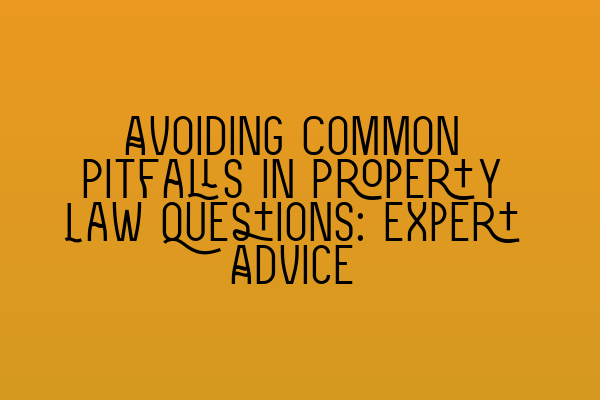Avoiding Common Pitfalls in Property Law Questions: Expert Advice
Property law is a complex area that requires a deep understanding of legal principles and a keen attention to detail. Whether you are a law student preparing for the SQE exam or a practicing solicitor, it is important to be aware of the common pitfalls that can arise when dealing with property law questions. In this article, we will provide expert advice on how to avoid these pitfalls and successfully navigate property law questions.
1. Understand the Basics
Before diving into the specifics of property law, it is crucial to have a solid understanding of the basics. This includes familiarizing yourself with the key legal concepts and terminology related to property law. If you are a law student preparing for the SQE exam, make sure to check out our article on “Functioning Legal Knowledge (FLK): Core Concepts for SQE Candidates” [link]. By mastering the core concepts, you will be better equipped to tackle more complex property law questions.
2. Know Your Jurisdiction
Property law can vary significantly depending on the jurisdiction you are operating in. It is essential to have a thorough understanding of the laws and regulations specific to your jurisdiction. This includes understanding the statutory requirements for property transactions, the rights and obligations of property owners, and any local ordinances or regulations that may impact property-related issues. To enhance your research skills and gain a deeper understanding of legal research methods, be sure to read our article on “Unlocking Legal Research Skills for SQE Success” [link].
3. Pay Attention to Details
One of the most common pitfalls in property law questions is overlooking important details. Property transactions often involve intricate legal documents and contracts that need to be carefully reviewed and understood. Failing to pay attention to key provisions or missing crucial information can have serious consequences. Therefore, it is essential to develop a keen eye for detail and ensure that you thoroughly analyze all relevant documents and facts.
4. Stay Up-to-Date with Changes in the Law
Property law is a constantly evolving field, with new legislation and case law developments shaping its landscape. As a property law practitioner, it is crucial to stay updated with the latest changes in the law to ensure that your advice and legal opinions are accurate and up-to-date. Regularly consult legal resources and authoritative texts to remain informed. A comprehensive understanding of the subject matter can be built by referring to our article on “Essential SQE Textbooks: Building a Solid Foundation for Exam Prep” [link].
5. Utilize Case Law
Case law plays a crucial role in property law, providing precedents and interpretations that guide legal arguments and decisions. By studying relevant cases and understanding how they apply to different scenarios, you can strengthen your legal analysis and improve your ability to tackle property law questions effectively. Referencing our article on “Unraveling the SQE Stages: A Roadmap to Success” [link] will provide you with a clear understanding of the stages involved in the SQE exam.
6. Seek Professional Advice if Needed
Property law can be complex and nuanced, and there may be instances where seeking professional advice is necessary. If you encounter a particularly challenging property law question that is outside your area of expertise, consider consulting with a more experienced colleague or seeking guidance from a specialist in property law. It is always better to seek advice and ensure the accuracy of your answers rather than guessing and potentially providing incorrect information.
In conclusion, avoiding common pitfalls in property law questions requires a comprehensive understanding of the subject matter, attention to detail, staying updated with changes in the law, and utilizing appropriate legal resources. By following these expert advice tips and integrating them into your approach to property law questions, you will be better equipped to provide accurate and reliable advice.
For more information and guidance on the SQE exam, including details on test centers and exam preparation, check out our related articles:
– “48. Unlocking Legal Research Skills for SQE Success” [link]
– “53. Functioning Legal Knowledge (FLK): Core Concepts for SQE Candidates” [link]
– “44. Essential SQE Textbooks: Building a Solid Foundation for Exam Prep” [link]
– “43. Unraveling the SQE Stages: A Roadmap to Success” [link]
– “41. Test Centers for SQE: Convenient Locations for the Exam” [link]
Remember, property law questions can be challenging, but with the right knowledge and approach, you can avoid common pitfalls and excel in your property law practice or SQE exam preparation.
